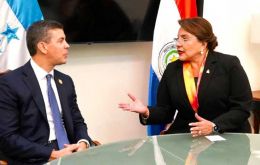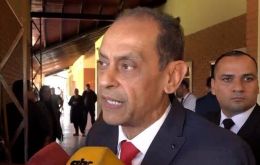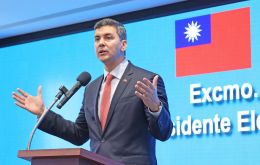MercoPress. South Atlantic News Agency
Tag: Santiago Peña
-
Monday, June 17th 2024 - 19:14 UTC
Paraguay's potential highlighted by leading international outlet

Paraguay's latest achievements as a top Latin American destination for foreign investments have been highlighted by One World Media. The outlet praised the South American country's macroeconomic and political stability coupled with its natural resources, strategic position, and gender equality regulations.
-
Monday, June 3rd 2024 - 10:29 UTC
Mercosur and Celac heads exchange views in San Salvador

Presidents Santiago Peña of Paraguay and Xiomara Castro of Honduras, who also chair the Southern Common Market (Mercosur) and the Community of Latin American and Caribbean States (Celac) respectively, got together while in San Salvador during Nayib Bukele's new inauguration as President of El Salvador to discuss “issues related to how to promote a joint agenda,” it was reported.
-
Monday, May 27th 2024 - 20:17 UTC
Buenos Aires Rural Fair lures three presidents together

Conservative Presidents Luis Lacalle Pou of Uruguay and Santiago Peña of Paraguay are to join their hosting colleague Javier Milei on July 28 in Buenos Aires for the annual International Livestock, Agriculture, and Industry Exhibition, also known as the Rural Fair, it was announced.
-
Thursday, May 23rd 2024 - 18:57 UTC
Paraguayan Justice Minister resigns

Paraguayan Justice Minister Ángel Ramón Barchini turned in his resignation at President Santiago Perña's request, it was reported Thursday in Asunción. According to local media, Deputy Criminal Policy Minister Rodrigo Nicora will take over Barchini's position on an interim basis.
-
Tuesday, May 21st 2024 - 20:38 UTC
Taiwanese company gets deal to build electric buses in Paraguay

Paraguayan authorities signed a memorandum of understanding with Taiwan's Master Transportation to produce electric buses for the South American country. The arrangements were made during President Santiago Peña's tour of the Island with Industry and Commerce Minister Javier Giménez, who signed on behalf of the visiting delegation. Company President Ting-Fa Wu represented the producers of the DMIT e-Bus.
-
Thursday, May 16th 2024 - 22:25 UTC
Peña highlights Paraguay's progress and Argentina's lack thereof

Paraguayan President Santiago Peña highlighted his country's “remarkable growth” and “flourishing democracy” in contrast with Argentina's mercurial performance. He made those remarks late Wednesday upon receiving the “CHLI Founders Award for International Leadership” during the Annual Gala and Leadership Awards in Washington DC.
-
Wednesday, May 15th 2024 - 16:39 UTC
Paraguayan President off on US, Taiwan tour

Paraguayan President Santiago Peña left Tuesday for the United States to participate in a series of engagements regarding security and technology until May 17 when he will go to Taiwan. Peña took heavy criticism for bringing along his son Gonzalo Peña. The head of state said he would cover his son's expenses with his own money but is yet to show concrete evidence thereof.
-
Monday, May 13th 2024 - 20:09 UTC
Paraguayan beef granted entry into Canadian market

Canada's Food Inspection Agency (CFIA) greenlighted the entry of Paraguayan meat into their market with nine packing plants already authorized to start shipments. Paraguayan President Santiago Peña celebrated the good news with postings on social media. “I congratulate all the institutions and sectors involved for this important achievement,” he wrote.
-
Wednesday, April 17th 2024 - 10:36 UTC
Business forum in Bariloche to be attended by Presidents of Uruguay, Argentina, and Paraguay

Presidents Javier Milei of Argentina, Luis Lacalle Pou of Uruguay, and Santiago Peña of Paraguay are expected to be the three most important participants of the so-called Llao Llao Forum starting Wednesday in the Patagonian resort of Bariloche in the Argentine province of Río Negro.
-
Friday, April 12th 2024 - 09:50 UTC
Presidents Peña and Lacalle Pou fly together to Uruguay

After attending a South American Football Confederation (Conmebol) event in Luque on Thursday, Presidents Luis Lacalle Pou and Santiago Peña flew to Uruguay for further engagements.
